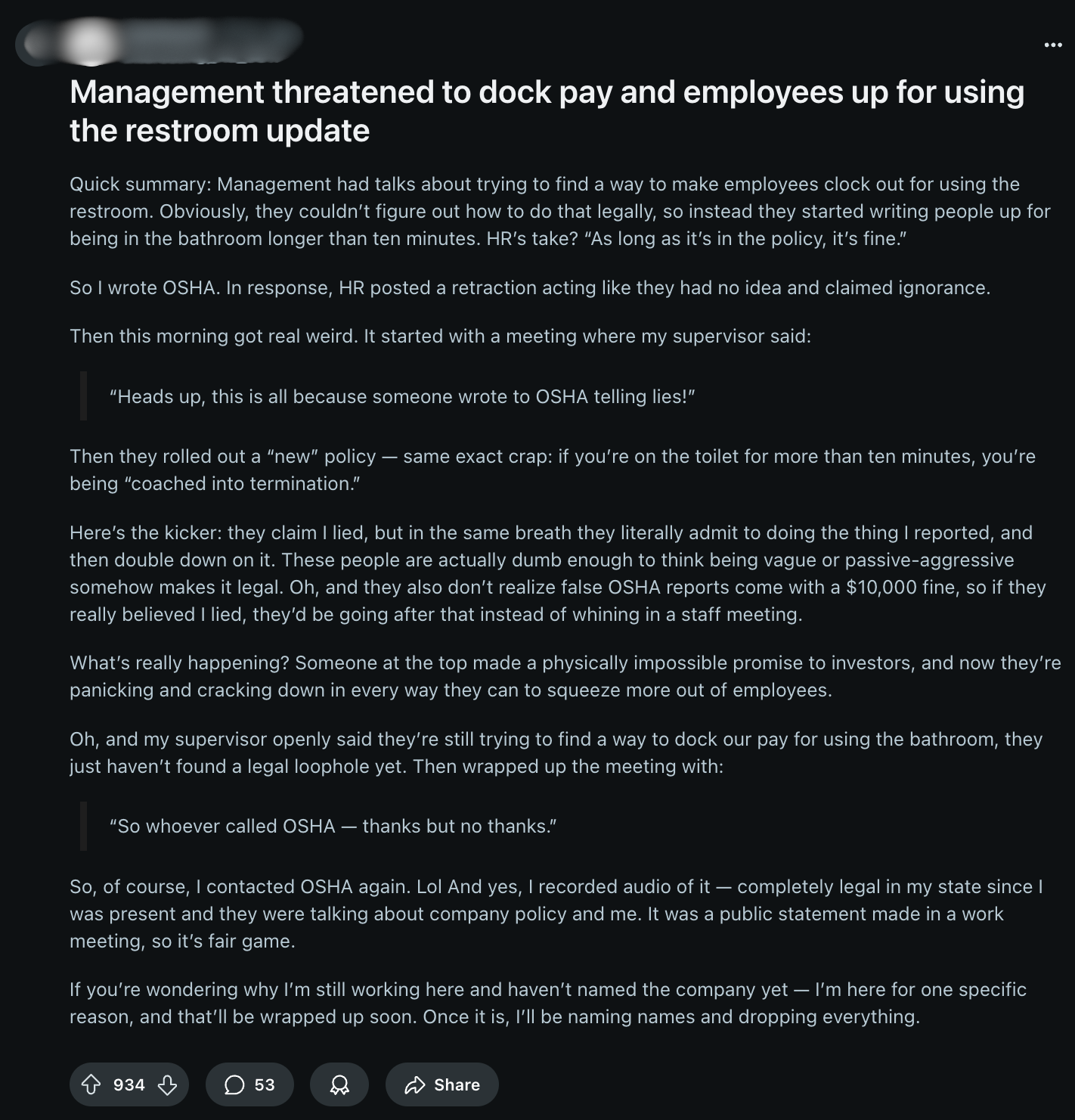US firm tells employees to clock out for restroom breaks: Here’s why labour laws matter now more than ever

In a recent case that sparked widespread attention online, a US-based employee exposed a company’s controversial policy requiring workers to clock out for using the restroom. When legal risks emerged, the company shifted tactics, opting instead to discipline staff who spent more than ten minutes in the bathroom. Backed by HR, the policy led to formal write-ups and threats of termination masked as “coaching.” But one employee didn’t stay silent. Armed with legal knowledge, documentation, and state laws on workplace recording, they filed a complaint with OSHA (Occupational Safety and Health Administration). The case now serves as a striking reminder: labor laws are not just fine print, they’re essential protections for every employee, and a crucial area of understanding for future HR professionals, business leaders, and students entering the workforce.Here is the Reddit post shared by a US-based employee:

Reddit post highlighting the incident about US-based firm monitoring restroom breaks taken by employees.
When bathroom time becomes company policy
The issue began when management floated the idea of having employees clock out during restroom breaks, meaning time away from their workstation would be unpaid. Unable to implement that legally, the company switched to a different approach: employees who spent more than ten minutes in the bathroom would be issued formal warnings.This policy quickly escalated into an HR-approved disciplinary system. Repeated “violations” meant being “coached into termination”: a corporate euphemism for pushing someone out without direct firing.
A complaint triggers a messy response
The employee, recognising the potential legal and ethical violations, filed a complaint with OSHA, the federal body that monitors workplace health and safety. Soon after, HR posted a vague retraction, acting as though the policy had been misunderstood or misapplied.But the very next day, in a team meeting, a supervisor blamed the anonymous OSHA complaint, accused someone of “lying,” and reintroduced the same policy under a new name. They openly admitted they were still seeking legal loopholes to dock pay for restroom use, highlighting just how committed the company was to controlling time, regardless of workers’ well-being.
One employee fights back, again
Instead of being intimidated, the employee filed a second OSHA complaint, and this time, came prepared. Knowing their state allows single-party consent recording, they recorded the meeting where the policy and retaliation were discussed. Since the meeting was about workplace rules and discipline, it counted as a public discussion under company policy.The employee has stated they plan to publicly name the company and release all evidence once they complete their personal reason for staying in the job.
Why labour laws matter more than ever
This case may seem unusual, but it reveals deeper problems that HR students, business leaders, and professionals-in-training must understand:
- Human rights are not negotiable. Denying or punishing basic needs like restroom access creates a hostile and possibly unsafe work environment.
- Internal policies must still follow the law. HR departments cannot hide behind “it’s in the policy” if the rule contradicts labor standards or human dignity.
- Retaliation is a serious legal risk. Publicly blaming an employee for reporting to a labor authority can lead to fines or lawsuits.
- Knowledge is power. The employee in this case understood the law and used it — not to cause trouble, but to restore fairness. That’s the kind of professionalism students should aim for.
The bottom line
As corporate environments become more performance-obsessed, cases like this are reminders of what happens when metrics override morality. For students pursuing careers in human resources, business management, or labour law, this is more than a viral post. It’s a modern-day case study.Labour laws are not just about wages or safety gear. They’re about respect, dignity, and the boundaries between policy and abuse. The next generation of professionals has a responsibility to know them, and to apply them wisely.TOI Education is on WhatsApp now. Follow us here.





